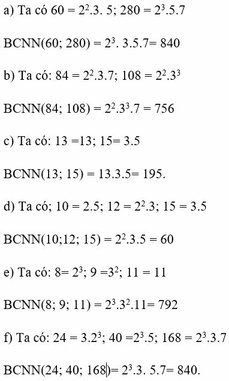giúp mình với (-9):168=15:(7x)(−9):168=15:(7x)
Hãy nhập câu hỏi của bạn vào đây, nếu là tài khoản VIP, bạn sẽ được ưu tiên trả lời.



Mình làm 5 câu thôi nhé !:
1) \(7^x\cdot49=7^{90}\)
\(\Rightarrow7^x\cdot7^2=7^{90}\)
\(\Rightarrow7^{x+2}=7^{90}\)
\(\Rightarrow x=90-2\)
\(\Rightarrow x=88\)
2) \(2^x\cdot4=128\)
\(\Rightarrow2^x\cdot2^2=2^7\)
\(\Rightarrow2^{x+2}=2^7\)
\(\Rightarrow x=7-2\)
\(\Rightarrow x=5\)
3) \(3^x-1=2^4\cdot5\)
\(\Rightarrow3^x=80+1\)
\(\Rightarrow3^x=81\)
\(\Rightarrow3^x=3^4\)
\(\Rightarrow x=4\)
4) \(3^x+15=42\)
\(\Rightarrow3^x=42-15\)
\(\Rightarrow3^x=27\)
\(\Rightarrow3^x=3^3\)
\(\Rightarrow x=3\)
5) \(4\cdot2^x-3=125\)
\(\Rightarrow2^2\cdot2^x=128\)
\(\Rightarrow2^{x+2}=2^7\)
\(\Rightarrow x=7-2\)
\(\Rightarrow x=5\)
6)
\(5^x=5^{15}:5^3\\ \Leftrightarrow5^x=5^{15-3}\\ \Leftrightarrow5^x=5^{12}\\ \Leftrightarrow x=12\)
7)
\(4^x=4^{15}:16\\ \Leftrightarrow4^x=4^{15}:4^2\\ \Leftrightarrow4^x=4^{15-2}\\ 4^x=4^{13}\\ \Leftrightarrow x=13\)
8)
\(7^x=7^{20}:7^{10}\\ \Leftrightarrow7^x=7^{20-10}\\ \Leftrightarrow7^x=7^{10}\\ \Leftrightarrow x=10\)
9)
\(11^x=11^{11}:11\\ \Leftrightarrow11^x=11^{11-1}\\ \Leftrightarrow11^x=11^{10}\\ \Leftrightarrow x=10\)
10)
\(3^{15}.3^x=3^{30}\\ \Leftrightarrow3^x=3^{30}:3^{15}\\ 3^x=3^{30-15}\\ \Leftrightarrow3^x=3^{15}\\ \Leftrightarrow x=15\)

\(9x-5x+3x=56\)
<=> \(7x=56\)
<=> \(x=8\)
Vậy...
\(9x-x+3x=165\)
<=> \(11x=165\)
<=> \(x=15\)
Vậy....
\(7x+8x-x=168\)
<=> \(14x=168\)
<=> \(x=12\)
Vậy...
\(\frac{5}{8}x-\frac{1}{3}x-\frac{1}{6}x=15\)
<=> \(\frac{1}{8}x=15\)
<=> \(x=120\)
Vậy...
Dấu . là dấu nhân nha
---
a, 9 . x - 5 . x + 3 . x = 56
x . (9 - 5 + 3) = 56
x . 7 = 56
x = 56 : 7
x = 8
b, 9 . x - x + 3 . x = 165
x . (9 - 1 + 3) = 165
x . 11 = 165
x = 165 : 11
x = 15
c, 7 . x + 8 . x - x = 168
x . (7 + 8 - 1) = 168
x . 14 = 168
x = 168 : 14
x = 12
d, 5/8 . x - 1/3 . x - 1/6 . x = 15
x . (5/8 - 1/3 - 1/6) = 15
x . 1/8 = 15
x = 15 : 1/8
x = 120

a: =>x-1/2=0 hoặc 2x+5=0
=>x=1/2 hoặc x=-5/2
b:=>-4x=-6
=>x=3/2
a)\(\left(\dfrac{x-1}{2}\right)\left(2x-5\right)=0\)
⇔\(\dfrac{x-1}{2}=0\) \(hoặc\) \(2x-5=0\)
⇔\(\dfrac{x-1}{2}\cdot\dfrac{1}{2}=0\cdot\dfrac{1}{2}\) \(hoặc\) \(2x=5\)
⇔\(x-1=0\) \(hoặc\) \(\dfrac{2x}{2}=\dfrac{5}{2}\)
⇔\(x=1\) \(hoặc\) \(x=\dfrac{5}{2}\)
Vậy phương trình có tập nghiệm là: \(S=\left\{1;\dfrac{5}{2}\right\}\)
b)\(15-7x=9-3x\)
⇔\(-7x+3x=9-15\)
⇔\(-4x=-6\)
⇔\(\dfrac{-4x}{-4}=\dfrac{-6}{-4}\)
⇔\(x=\dfrac{-6}{-4}\)
⇔\(x=\dfrac{3}{2}\)
Vậy phương trình có nghiệm là \(x=\dfrac{3}{2}\)

a)Ta có 60 = 2 2 .3. 5; 280 = 2 3 .5.7
BCNN(60; 280) = 2 3 . 3.5.7= 840
b) Ta có: 84 = 2 2 .3.7; 108 = 2 2 . 3 3
BCNN(84; 108) = 2 2 . 3 3 .7 = 756
c) Ta có: 13 =13; 15= 3.5
BCNN(13; 15) = 13.3.5= 195.
d) Ta có; 10 = 2.5; 12 = 2 2 .3; 15 = 3.5
BCNN(10;12; 15) = 2 2 .3.5 = 60
e) Ta có: 8 = 2 3 ; 9 = 3 2 ; 11 = 11
BCNN(8; 9; 11) = 2 3 . 3 2 .11= 792
f) Ta có: 24 = 3. 2 3 ; 40 = 2 3 .5; 168 = 2 3 .3.7
BCNN(24; 40; 168)= 2 3 .3. 5.7= 840

-15 + 19x = 9 + 7x
=> 19x - 7x = 9 + 15
=> 12x = 24
=> x = \(\dfrac{24}{12}\)= 2
